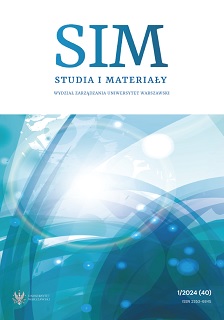Innowacje odwrócone – kluczowe czynniki sukcesu i bariery transferu innowacji z rynków rozwiniętych do rozwijających się
Reverse Innovation - Key Success Factors and Barriers
to Innovation Transfer From Developed to Developing Markets
Author(s): Aleksandra Kwiatkowska, Karolina ŁudzińskaSubject(s): National Economy, Socio-Economic Research
Published by: Wydawnictwo Naukowe Wydziału Zarządzania Uniwersytetu Warszawskiego
Keywords: reverse innovation; innovation transfer; developing countries; markets;
Summary/Abstract: Purpose: The main objective of the research is to analyze the transfer of innovations from developed to developing markets within the framework of the concept of reverse innovation and to identify key factors that contribute to its success and those that may constitute potential sources of difficulties and barriers. As a secondary goal, the study aims to trace the genesis and development of the concept of reverse innovation and those innovation concepts that have become its nucleus. Design/methodology/approach: To conduct the research, a methodological approach was adopted that involved a review of selected publications as well as a systematic literature review, which was enriched by a SWOT analysis which served to aggregate, organize, and interpret the obtained research results. The retrospective and comparative analysis method, as well as the descriptive method, were also included, which enabled a careful presentation of the genesis and development of the concept of reverse innovations. Findings: The analysis identified key factors for the successful transfer of reverse innovations from developed to developing markets and highlighted potential challenges. A vital factor is a company’s adaptability from developed markets to the nuances of emerging ones, especially consumer needs. At the same time, the results of the research indicate the potential for the development of the concept of reverse innovation and its close connection to the idea of sustainability. Research limitations/implications: The concept of reverse innovation represents a relatively new perspective on innovation management. Thus, the analysis drew from a limited pool of empirical studies and source literature. Originality/value: This comprehensive analysis enhances our understanding of reverse innovation in management and quality sciences. Utilizing the SWOT analysis as a framework to summarize and categorize the key factors and challenges of reverse innovation transfer from developed to developing countries represents a novel contribution by the authors to the academic field.
Journal: Studia i Materiały
- Issue Year: 40/2024
- Issue No: 1
- Page Range: 4-25
- Page Count: 22
- Language: Polish

